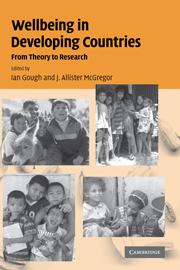Book contents
- Frontmatter
- Contents
- Figures
- Tables
- Notes on contributors
- Acronyms
- Preface
- Introduction
- 1 Theorising wellbeing in international development
- Part I Human needs and human wellbeing
- Part II Resources, agency and meaning
- 7 Wellbeing, livelihoods and resources in social practice
- 8 Livelihoods and resource accessing in the Andes: desencuentros in theory and practice
- 9 Poverty and exclusion, resources and relationships: theorising the links between economic and social development
- Part III Quality of life and subjective wellbeing
- Conclusion: researching wellbeing
- References
- Index
8 - Livelihoods and resource accessing in the Andes: desencuentros in theory and practice
Published online by Cambridge University Press: 22 September 2009
- Frontmatter
- Contents
- Figures
- Tables
- Notes on contributors
- Acronyms
- Preface
- Introduction
- 1 Theorising wellbeing in international development
- Part I Human needs and human wellbeing
- Part II Resources, agency and meaning
- 7 Wellbeing, livelihoods and resources in social practice
- 8 Livelihoods and resource accessing in the Andes: desencuentros in theory and practice
- 9 Poverty and exclusion, resources and relationships: theorising the links between economic and social development
- Part III Quality of life and subjective wellbeing
- Conclusion: researching wellbeing
- References
- Index
Summary
Introduction
As much as development is about encounters (Escobar 1995; Long 1989; Peters 2000), it is also about desencuentros – discontinuities, misunderstandings, conflicting interpretations, impositions and resistances. The discussions of livelihoods (or often sustainable livelihoods) that came increasingly into vogue during the 1990s reflect such a sense of desencuentro. Scholars, practitioners and activists have invoked the notion of livelihood in order to argue that the ways in which poor people get by are far more complex than most interventions allow for. The idea has also been used by those working within the ‘they know how’ (Chambers 1983; Meehan 1978) tradition of populist, basista approaches to development, in order to argue that the only livelihoods that stand any hope of being sustainable will be those that build on the ways in which poor people currently live, that reflect people's own knowledge and that are grown from the grassroots (Chambers 1987; Chambers and Conway 1992).
This chapter explores such encounters and desencuentros between livelihoods and development interventions – in this case, the interventions of aid chains involving Dutch and Andean NGOs. Specifically, the chapter focuses on the asset (resource) management dimensions of rural livelihoods to explore the points at which household strategies of resource accessing converge with and diverge from the strategies through which actors within the nongovernmental aid chain aim to enhance household asset bases. As will be clear, the degree of convergence/divergence varies according to type of household and – to some extent – type of NGO. This appears to reflect dissonances between what it is that intervention strategies imply rural people want for their and their children's future, and what it is that rural people appear to be seeking for this future.
- Type
- Chapter
- Information
- Wellbeing in Developing CountriesFrom Theory to Research, pp. 176 - 198Publisher: Cambridge University PressPrint publication year: 2007
- 9
- Cited by



